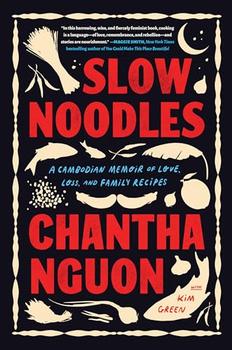Book Club Discussion Questions
Want to participate in our book club? Join BookBrowse and get free books to discuss!
Please be aware that this discussion guide will contain spoilers!
-
In the prologue, Chantha explains her "slow noodles" philosophy in the kitchen and in life. What does that phrase, and the book's title, mean to her?
-
Chantha writes that "the Khmer Rouge informed the Cambodian people that we had no history." What did "Year Zero" signify to Pol Pot and his revolutionaries, and to the people who lived through the Khmer Rouge regime in 1975 to 1979?
-
Why did Chantha include so many food descriptions and recipes in her memoir? Why do you think there's such a powerful connection between food and memory?
-
What sets Cambodian foodways apart from the cuisines of neighboring countries like Vietnam and Thailand? Why do you think Cambodian food has gotten less attention from food-curious Westerners than other national cuisines?
-
How does preserving Cambodian culinary history, something so important to Chantha, dovetail with the strength of women—and their bonds—in this memoir.
-
Chantha writes about the "Rules for Women" (the Chbab Srey) and quotes a Khmer saying: "Men are gold; women are cloth." What do the Chbab Srey and the proverb have to say about women's and girls' roles in the Cambodian traditions of Chantha's childhood? In what ways does Chantha fulfill or defy those expectations in her own life?
-
On the surface, "Silken Rebellion Fish Fry" is a recipe for rehabilitating a too-old fish using "the art of culinary disguise." What deeper truths about resilience and defiance does this recipe suggest? What does Chantha mean by the phrase "silken rebellion"?
-
When Chantha and her husband, Chan, were in the refugee camps, she saw a headline that said, "Charity Gets Tired." What does that mean? How can we avoid "empathy fatigue" when there are so many refugees fleeing wars, revolutions, and dire poverty, and so much uninformed rhetoric surrounding immigration policy?
-
A major theme of this memoir is the question of whether her mother's middle-class values prepared Chantha to survive alone as a young, penniless refugee. She often calls herself "spoiled" and "soft." Do you think Mae's lessons, beliefs, and recipes made Chantha too soft for a hard world or gave her the strength she would need to survive and rebuild her life?
-
What does it mean to Chantha, her mother, and her sister that she was born in the Year of the Buffalo? How do Chantha's belief in astrology and her Catholic faith intertwine? How do her beliefs about fate and agency evolve over time?
-
What does the Elephant Fish fable say about a mother's influence in a daughter's life, even after the mother is gone? Why do you think Chantha ends her book with this story?
-
In the epilogue, Chantha's daughter, Clara, writes, "If there's one thing I learned from my mother, it's that losing everything is not the end of the story." What does she mean by this? Do you find Chantha's story of survival and resilience relatable or inspiring? Are there ways to apply her experiences to your own struggles and losses, even if your life is very different from hers?
For the full book club kit please refer to the
publisher's page.
Unless otherwise stated, this discussion guide is reprinted with the permission of Algonquin Books. Any page references refer to a USA edition of the book, usually the trade paperback version, and may vary in other editions.




